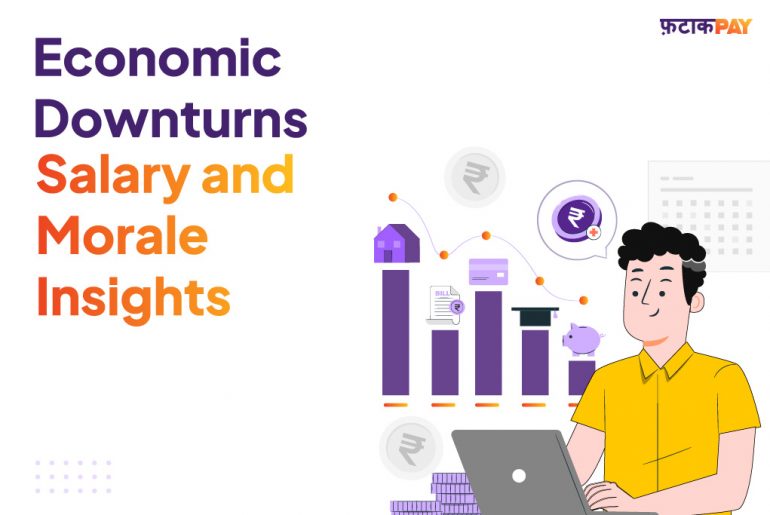Economic downturn refers to a period when a contraction in the overall output of goods and services within an economy typically characterizes an economic activity of a country.
Key Features of an economic downturn include a decline in GDP, Rising Unemployment, Reduced Industrial Production, Decreased Consumer Spending, Financial Market Volatility, Credit Tightening, or Business Contraction.
During this period, there are usually unfavorable developments in several economic parameters, including GDP, employment figures, industrial output, and consumer expenditure.
This blog will cover how you, as an employer, can Adjust your Salary during times of crisis and maintain the morale of your employees. That will help you to get through tough times and keep the talent you need for future growth.
Salary Strategies That Employer Can Adjust During Times of Crisis
1. Salary Adjustments in Times of Crisis
Wage Freezes and Salary Reductions:
When things get tough financially, businesses sometimes have to make tough choices. One option is to freeze salaries or cut them to keep costs down and the company afloat.
But it’s not just about the money – bosses have to think about how it’ll affect their employees’ morale, job satisfaction, and productivity in the long run. It’s a tricky balance since they need to be financially responsible without hurting their employees or the company culture.
The Importance of Transparent Communication:
Being transparent and open about salary adjustments is essential for businesses, especially during tough times. If employees understand the reasons behind the changes, it helps them trust the company and manage their expectations.
Sharing information about the company’s financial situation and potential future changes can also help employees better prepare for future challenges. All in all, being transparent about these things creates a more supportive work environment.
Alternatives to Traditional Compensation Adjustments:
As companies look for new ways to deal with salary-related issues without resorting to pay cuts, they are exploring some exciting alternatives. One such option is offering performance-based incentives or bonuses.
This approach encourages employees to perform better and stay motivated, even when the company is facing financial challenges. Businesses can maintain employee engagement and motivation by rewarding individual or team achievements. (fatakpay?)
Balancing Cost-Cutting Measures with Employee Retention Strategies:
When the economy is uncertain, companies often have to cut costs. However, keeping your employees happy and motivated for long-term success is essential. Professional development, flexible work arrangements, and other perks showing you care about their well-being and growth can help.
Cutting costs may be necessary for financial stability, but retaining valuable employees is equally important. By finding this balance, you can get through tough times and keep the talent you need for future growth.
2. Maintaining Morale Amidst Economic Challenges
The Psychological Toll of Economic Uncertainty:
When the economy takes a dip, it can mess with people’s heads, especially regarding job security and finances. That’s why it’s so crucial for employers to keep the lines of communication open, provide access to support services, and create a work environment that’s positive and uplifting. These steps can help people stay strong and united, even in tough times.
Leadership in Times of Crisis:
Effective leadership is crucial during economic crises, requiring transparency, empathy, and decisiveness. Leaders should communicate openly, discuss challenges honestly, and provide a clear direction, fostering trust and unity to navigate uncertainties and maintain a positive organizational culture.
Employee Engagement Initiatives:
During tough economic times, keeping morale high at work is really important. You can involve team-building activities, recognition programs, and fostering a positive work environment to maintain or increase high morale. By investing in the happiness and satisfaction of employees, you’ll end up with a motivated and resilient workforce.
3. Recognizing and Rewarding Employee Efforts
Even when times are tough, giving credit where credit is due is essential. Recognizing and rewarding employees for their hard work, no matter how small helps create a happy and positive workplace. It’s all about building a culture of appreciation and loyalty within the organization!
Upskilling and Reskilling as a Morale Booster:
Investing in employee development during downturns is crucial for boosting morale and preparing the workforce for future challenges. Upskilling allows employees to adapt to changing business needs, contributing to organizational resilience. Fostering a learning culture aligns individual growth with corporate goals, promoting a sense of purpose and motivation.
Flexible Work Arrangements and Morale:
Embracing remote work and flexible schedules is vital in maintaining employee morale, particularly in remote work. Prioritizing work-life balance, leveraging technology for flexible arrangements, and adapting policies to support a hybrid work model contribute to a positive work environment and employee well-being.
Employee Mental Health and Well-being:
Employers must identify their employees’ stress and burnout symptoms to take preemptive measures. Creating a workplace culture that supports mental health by offering counseling services, promoting work and work-life balance, and encouraging open communication about mental health issues can help break down the stigma surrounding mental health and create a more supportive work environment.
Conclusion:
It’s essential to take a comprehensive approach to navigate challenging economic times. HR and leadership play a critical role in nurturing employee welfare, and the blog highlights the significance of staying united and resilient during such difficult phases.
As we move forward, it’s essential to ponder over the upcoming work landscape and plan accordingly, focusing on flexibility and prioritizing the needs of employees.
About FatakPay:
FatakPay offers universal access to virtual credit facilities. You may access it on your phone and use it for both online and offline daily requirements. Payments are made easily using UPI/QR codes. With the ability to scan now, pay later, and have simple payback alternatives, the system offers a nearly cost-free, fast, transparent, and secure way to transact multilingually.
Click Here to Download FatakPay app or Visit Our website.







